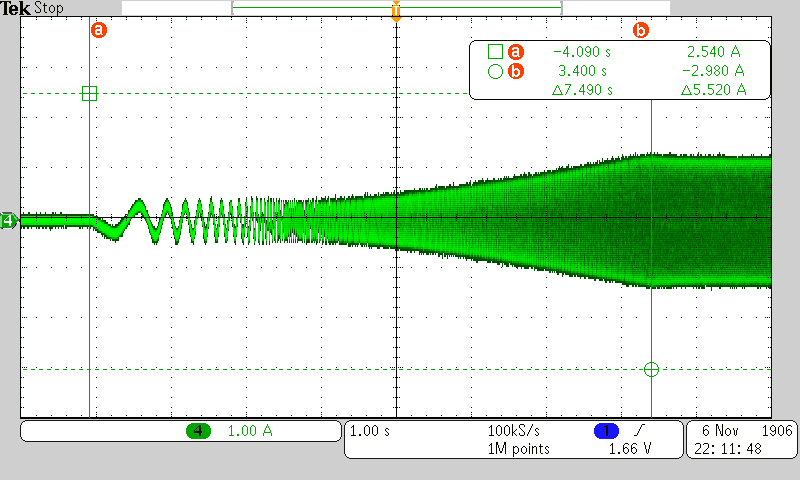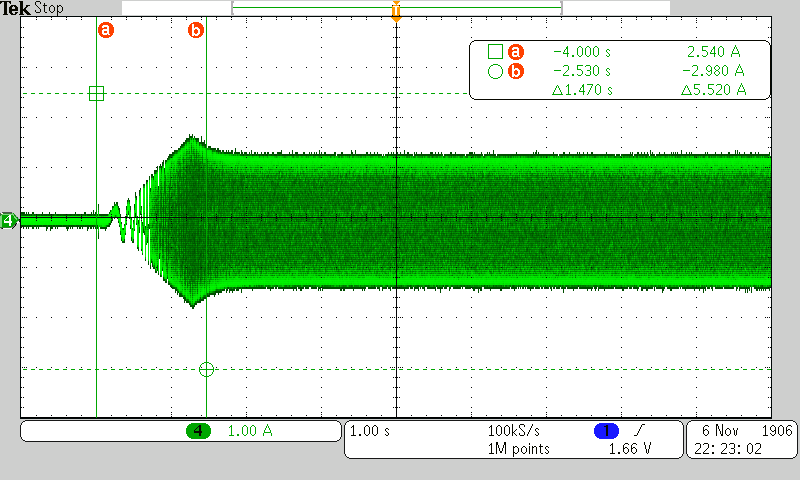SLLA621A September 2023 – October 2023 MCF8315A , MCF8316A
3.2 How to Solve Quick Startup Issues
We need to adjust the speed in each step to the designed for value separately to obtain the fastest startup speed which is still successful.
- Motor startup
The fastest choice for Motor startup is IPD, but IPD also introduces other potential problems, such as audible noise. We need to carefully adjust Increase IPD current threshold [IPD_CURR_THR] to rated current of the motor. For more introduction to starting, please refer to: MCF8316A -Design Challenges and Solution application note.
- Open Loop and Hand off
The parameters that affect startup at this stage are the open loop acceleration coefficient A1 [OL_ACC_A1] and open loop acceleration coefficient A2 [OL_ACC_A2]. We can increase the acceleration as much as possible, knowing that some protections are triggered, such as Lock – Limit.
For the Handoff stage, we can use automatic conversion, select Minimum BEMF for hand off [AUTO_HANDOFF_MIN_BEMF] to 0 mV, and turn on automatic switching,or switch manually, and choose a location that can make sure switching to the closed loop and quickly switch to the closed loop.
- Closed Loop
The key parameters are closed Loop acceleration when the estimator is not yet fully aligned and closed loop acceleration rate [CL_ACC]. We need to increase them as much as possible without losing sync and triggering overcurrent.
For the previous part, we need to make adjustments carefully to make sure that the motor does not lose synchronization/trigger protection. Remember, a quick startup is only meaningful if the startup is successful.
The following is an example configuration and the result :
Example 1:
Motor Parameter:
Motor phase resistance [Motor_RES]:1.15Ω
Motor phase inductance [Motor_IND]:0.96Ω
Motor BMEF Constant [Motor_BEMF_CONST] : 23 mv/Hz
Motor Start up option[MTR_STARTUP]:Align
Align or Slow first cycle current limit[ALIGN_OR_SLOW_CUR RENT_ILIMIT]: 0.15625A
Align or Slow first cycle ramp rate[ALIGN_SLOW_RAMP_RATE] : 1 A/s
Align time[ALIGN_TIME]:50ms
Open Loop current limit[OL_ILIMIT_CONFIG] : 0.3125A
Open Loop acceleration coefficient A1[OL_ACC_A1]:2.5Hz/s
Open Loop acceleration coefficient A2[OL_ACC_A2] :2.5Hz/s2
Open to close loop threshold[OPN_CL_HANDOFF_THR]: 8%
Close Loop acceleration when estimator is not yet fully aligned[CL_SLOW_ACC]: 10 Hz/s
Closed Loop acceleration rate[CL_ACC]:40Hz/s
 Figure 3-2 Example 1 Current Waveform
Figure 3-2 Example 1 Current WaveformExample 2:
Motor Start up option[MTR_STARTUP]:IPD
IPD current limit[IPD_CURR_THR] : 0.3125A
IPD Clock value[IPD_CLK_FREQ]: 1000 Hz
IPD Repeating time[IPD_REPEAT]:1 times
IPD High Resolution Enable[IPD_HIGH_RESOLUTION _EN]: Enable
Open Loop current limit[OL_ILIMIT_CONFIG] : 0.3125A
Open Loop acceleration coefficient A1[OL_ACC_A1]:10Hz/s
Open Loop acceleration coefficient A2[OL_ACC_A2]:80Hz/s2
Auto Handoff from open to close loop[AUTO_HANDOFF_EN]: Enabled
Close Loop acceleration when estimator is not yet fully aligned[CL_SLOW_ACC] : 100 Hz/s
Closed Loop acceleration rate[CL_ACC]: 300 Hz/s
 Figure 3-3 Example 2 Current Waveform
Figure 3-3 Example 2 Current WaveformFigure 3-3 shows that after parameter optimization, we can run the motor at 3000RPM within 1.5S.